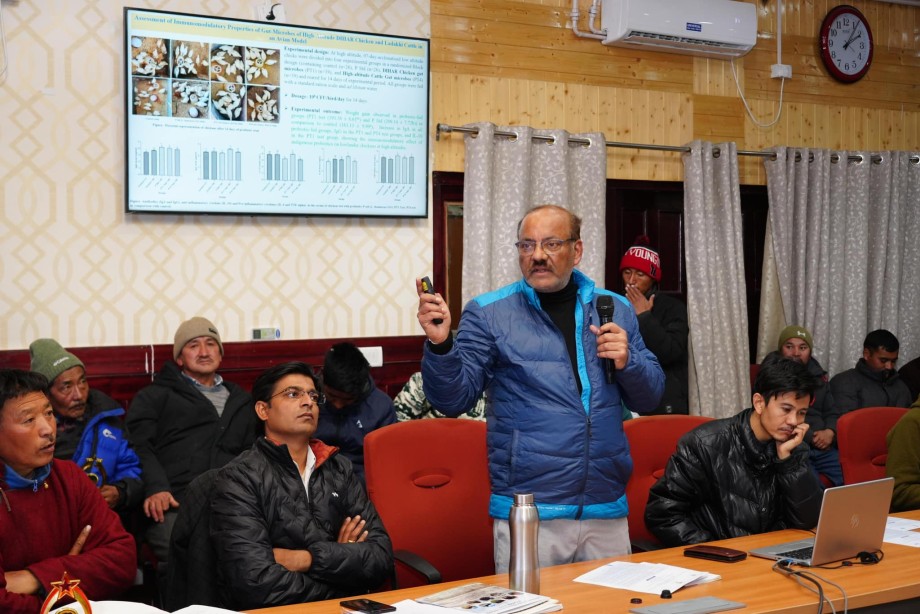ICAR and LAHDC lead discussions on promoting Ladakh’s livestock and dairy sector

A meeting to address the preservation and promotion of Ladakh’s unique livestock and animal genetic resources, including the Ladakhi cow and yak, was held at the DC Conference Hall on December 18. Organised by ICAR, the meeting was chaired by Chairman/CEC Adv. Tashi Gyalson of LAHDC Leh, with the presence of Executive Councillor for Animal Husbandry, Tashi Namgyal Yakzee, and ICAR Deputy Director (Animal Science) Dr. Raghavendra Bhatta.
The event brought together herders, scientists, government officials, and stakeholders to discuss strategies for characterization, registration, and value addition of Ladakh's high-altitude breeds and explore sustainable agricultural practices suited to the region.
Prominent attendees included Dr. O.P. Chaurasia, Director of DRDO-Defence Institute of High Altitude Research (DIHAR); Dr. Manishi Mukesh, Principal Scientist at ICAR; Dr. B.P. Mishra, Director of ICAR-National Bureau of Animal Genetic Resources; along with local herders, departmental heads, doctors, and scholars.
In his keynote address, Dr. B.P. Mishra emphasized the critical role of preserving Ladakh’s high-altitude animal breeds, such as the Indigenous cow and yak, in maintaining biodiversity and building climate resilience. He underscored their contribution to India’s broader efforts to protect Indigenous livestock.
Dr. Manishi Mukesh highlighted the exceptional nutritional and medicinal properties of Ladakhi cow and yak milk, which is rich in omega-3 fatty acids and possesses anti-cancer properties. He advocated for value addition in the dairy sector, emphasizing the potential for high-quality yak butter and cheese to gain market recognition through proper branding and Geographical Indication (GI) tagging.
Dr. Raghavendra Bhatta reflected on the strides in promoting Ladakh’s livestock sector. He stressed the importance of preserving indigenous breeds free from chemical contamination and warned against the risks of crossbreeding.
The event included the felicitation of local herders and livestock keepers, who received certificates of appreciation for their tireless efforts in preserving Ladakh’s unique livestock heritage.
A significant moment during the event was the submission of a GI application for “Ladakhi Cattle Churpi,” a local dairy product, to the Animal Husbandry Department of Ladakh. The GI tag will help protect the authenticity of these products and enhance their marketability, ensuring that Ladakh’s livestock and dairy offerings are recognized for their uniqueness.
Comprehensive documentation and publication on Animal Genetic Resources (ANGR) in Ladakh was also released. This initiative marks a significant step towards preserving the region’s unique livestock breeds and their genetic resources. Additionally, the Indian Council of Agricultural Research (ICAR) to established a dedicated centre, aimed at facilitating farmer training, exposure programs, and providing technical support to local herders. Starting next year, the center will also focus on improving livestock feed and providing better animal shelter facilities, further supporting the sustainable development of Ladakh’s pastoral economy.
Dr. Raghavendra Bhatta presented mementos to CEC Tashi Gyalson and Executive Councillor Tashi Namgyal Yakzee in recognition of their leadership and contributions to promoting Ladakh’s livestock heritage.
In his address, CEC Tashi Gyalson expressed gratitude to the honorees and stakeholders, commending their dedication and hard work. He reaffirmed the Council’s commitment to sustainable agricultural practices and aligned Ladakh’s development with Prime Minister Modi’s vision of making the region self-sustainable and organic.
Executive Councillor Tashi Namgyal Yakzee lauded the contributions of Ladakhi herders and pastoralists, noting the steady increase in the yak population and its growing importance to the region’s economy and ecosystem. He expressed gratitude to all participants for their efforts and commitment to preserving Ladakh’s unique livestock resources.
The meeting concluded with a collective resolve to safeguard Ladakh’s livestock heritage and promote sustainable development in the region’s agricultural sector.





